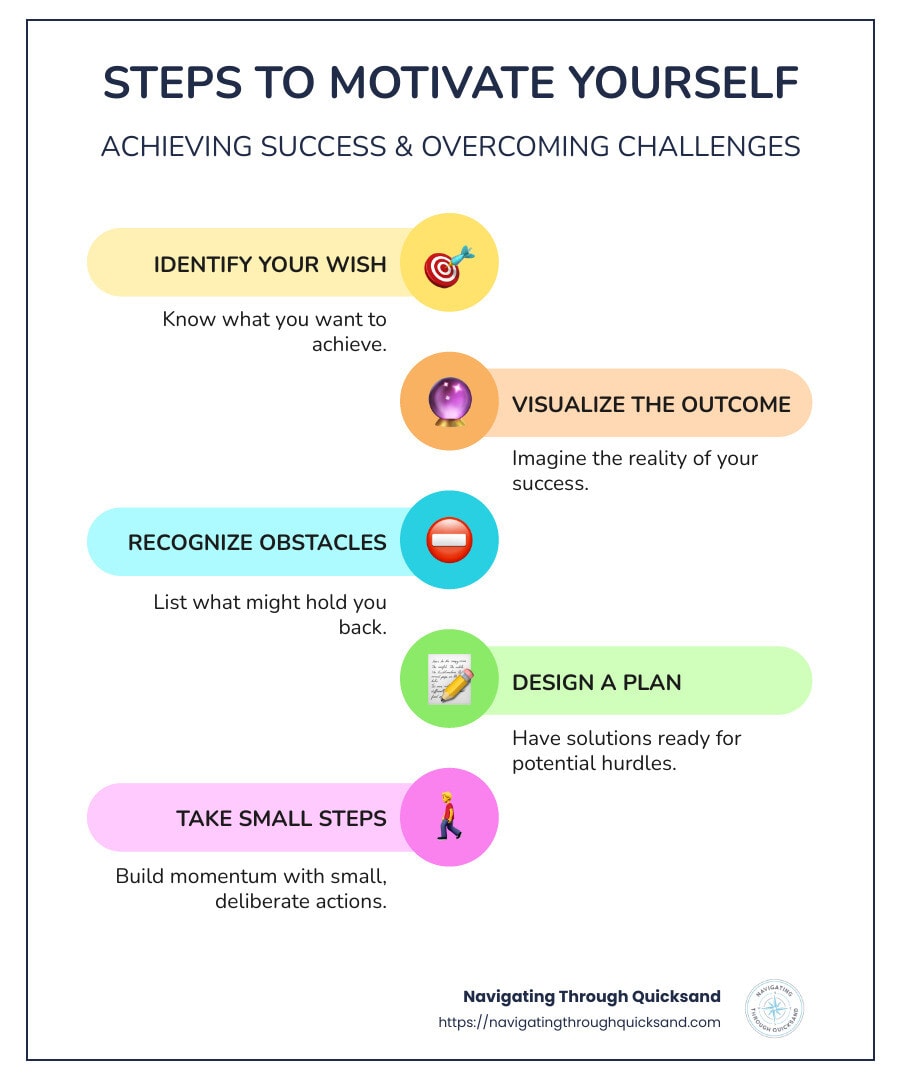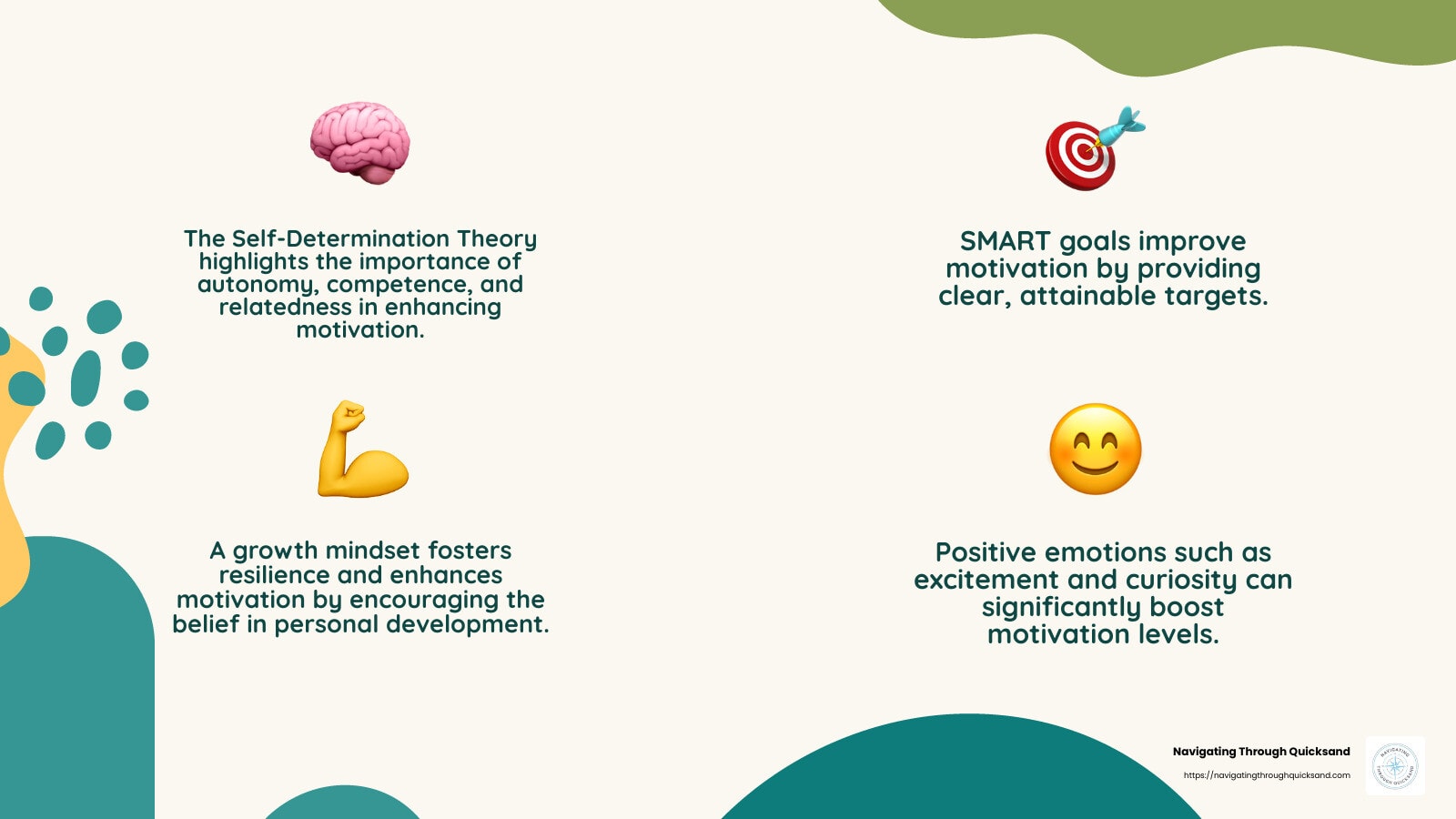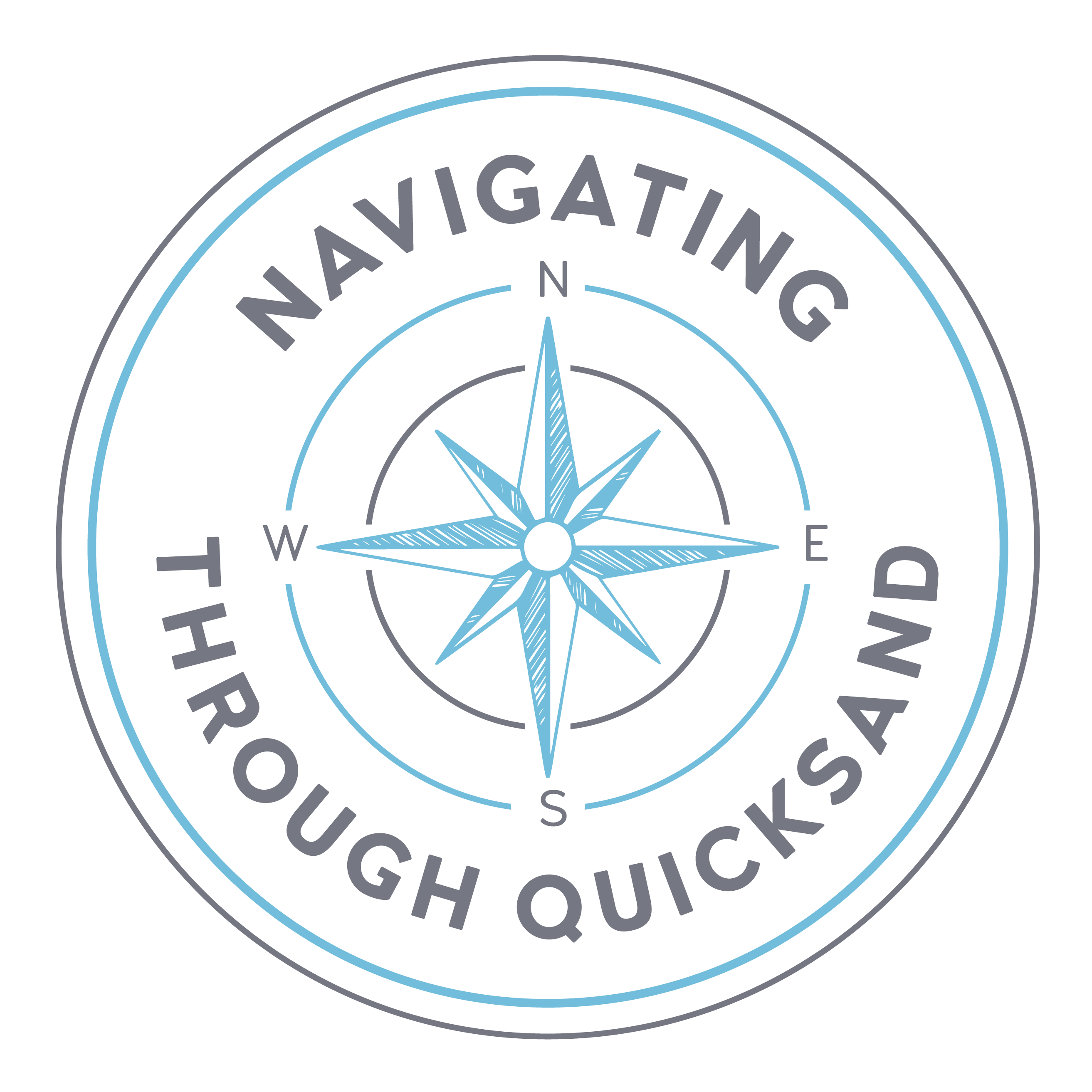How to motivate yourself when the weight of life’s challenges makes you feel stuck or when you’re feeling unmotivated can seem daunting, but it’s not impossible.
Success begins with understanding what truly drives you and setting manageable goals.
Here’s a quick breakdown to get started:
- Identify your wish — Know what you want to achieve.
- Visualize the outcome — Imagine the reality of your success.
- Recognize obstacles — List what might hold you back.
- Design a plan — Have solutions ready for potential problems.
Life is full of unexpected twists and turns. Whether you’re striving to excel in your career, reclaim your personal life, or simply feel more accomplished every day, approaching these tasks in small, deliberate steps can build momentum.
Naval Admiral William H. McRaven once said, “If you want to change the world, start off by making your bed.”
This simple task can pave the way for a remarkable day, proving that overcoming personal challenges starts with small wins.
Starting the journey to self-motivation with these insights can transform how you face everyday obstacles, turning them into stepping stones toward your growth and success.

Table of Contents
Understanding Motivation
To motivate yourself effectively, it’s crucial to understand the types of motivation and the psychological factors that influence them. Let’s break these down:
What is Motivation?
Motivation is the driving force that propels individuals to take action towards achieving their goals and desires. It is the spark that ignites the engine of productivity, creativity, and progress.
Motivation can come from within (intrinsic motivation) or from external sources (extrinsic motivation).
Intrinsic motivation is driven by personal interests, values, and passions, while extrinsic motivation is driven by external rewards, recognition, or pressure.
Understanding what motivates you is crucial to unlocking your full potential and achieving success in various aspects of life.
Intrinsic Motivation
Intrinsic motivation is when you do something because you genuinely enjoy it or find it fulfilling. It’s about personal satisfaction and interest. Imagine spending hours on a hobby simply because it makes you happy. That’s intrinsic motivation in action.
- Examples: Reading a book because you love the story, playing a sport for the joy of the game, or learning a new skill because it fascinates you.
Extrinsic Motivation
Extrinsic motivation, on the other hand, involves doing something for external rewards or to avoid negative consequences. This might include working for a paycheck or studying to get good grades.
- Examples: Completing a project to receive a bonus, exercising to lose weight, or attending a meeting to avoid criticism.
Psychological Factors and Mental Health
Understanding the psychological factors that affect motivation can help you harness them to your advantage. Identifying the root cause of motivational issues is crucial, as it allows you to tailor your strategies effectively.
- Self-Determination Theory: This theory suggests that people are more motivated when they feel in control of their actions. Autonomy, competence, and relatedness play key roles here.
- Goal Setting: Setting specific and achievable goals can boost motivation. The SMART goals framework (Specific, Measurable, Achievable, Relevant, Time-bound) is a practical tool for this.
- Mindset: Carol Dweck’s research on growth mindset shows that believing in your ability to improve can improve motivation. A growth mindset encourages resilience and persistence.
- Emotional State: Your emotions can significantly impact your motivation. Positive emotions like excitement and curiosity can fuel motivation, while negative emotions like fear and anxiety can hinder it.

By understanding these aspects of motivation, you can better tailor your strategies to boost your drive.
Whether it’s tapping into your intrinsic interests or setting up rewarding extrinsic goals, recognizing what motivates you at a psychological level is key to achieving your aspirations.
How to Motivate Yourself
Feeling stuck or unmotivated isn’t unusual. It happens to everyone. But the good news is, there are ways to push through and strategies for staying motivated. Let’s explore some strategies to motivate yourself and keep moving toward your goals.
Shake Things Up
Sometimes, a routine becomes a rut. When low motivation hits, changing your routine can refresh your mind. Mentally prepare yourself for new activities by setting intentions or changing into workout clothes. Try something new or different. It could be as simple as taking a different route to work, trying a new hobby, or even rearranging your workspace. Variety is the spice of life, and it can be a powerful motivator.
- New Activities: Engage in activities that excite you or make you curious. A fresh perspective can work wonders for your motivation.
- Mental Refresh: Consider short breaks to clear your mind. A quick walk or a few minutes of meditation can refresh your mental energy.
Set Realistic Goals
Setting goals is essential, but they need to be realistic. For example, setting fitness goals can help you navigate the challenges of your fitness journey. That’s where the SMART goals framework comes in. Goals should be Specific, Measurable, Achievable, Relevant, and Time-bound.
- Small Wins: Break your big goals into smaller, manageable tasks. Achieving these gives you a sense of accomplishment and builds momentum.
- Progress Tracking: Use tools like to-do lists or digital boards to track your progress. Seeing how far you’ve come can be a great motivator.
Plan for Imperfection
Life isn’t perfect, and neither is the path to your goals. Planning for obstacles can help you stay on track when things don’t go as expected.
- Obstacle Planning: Identify potential problems and plan how to deal with them. For instance, if internet issues might interrupt your online course, have lecture videos downloaded for offline access.
- WOOP Technique: Use the WOOP method—Wish, Outcome, Obstacle, Plan—to prepare for challenges. This technique, pioneered by Dr. Gabriele Oettingen, helps you anticipate and overcome obstacles effectively.
- Flexibility: Be flexible with your plans. Sometimes, missing a task is okay. Adapt and adjust as needed to keep moving forward.
By shaking up your routine, setting realistic goals, and planning for imperfections, you can overcome low motivation and stay on track toward achieving your aspirations.
Science-Backed Strategies to Boost Motivation

When you’re feeling stuck, science offers some effective strategies to motivate yourself and keep moving forward. A Navy SEAL once suggested that starting with small tasks can create momentum.
Let’s explore three powerful methods: putting your goal on the calendar, making it a habit, and rewarding yourself.
Put Your Goal on the Calendar
A target date can transform a vague dream into a concrete goal. Research shows that setting a specific deadline can significantly boost motivation and performance.
- External Motivation: Writing your goal on the calendar provides a visual reminder and a sense of urgency. It’s external motivation that keeps you accountable.
- Realistic Deadlines: Be realistic, but avoid giving yourself too much time. Studies indicate that longer deadlines can lead to procrastination. Aim for a balance that pushes you without overwhelming you.
- Progress Tracking: Use this target date to track your progress. Knowing how much time you have left can help you pace yourself and maintain focus.
Make Working Toward Your Goal a Habit
Habits can be powerful allies in your journey to achieve your goals. By turning desired actions into automatic responses, you reduce your reliance on fleeting motivation.
- If-Then Plans: Create “if-then” plans to establish habits. For instance, “If I finish breakfast, then I’ll read one chapter of my book.” This approach, known as implementation intention, makes it easier to stick to your goals.
- Daily Triggers: Find daily activities that can trigger your new habit. It could be as simple as pairing your goal-related task with brushing your teeth or having your morning coffee.
- Consistency: The key to habit formation is consistency. Repeatedly performing the action at the same time each day helps solidify it into your routine.
Reward Yourself with Small Wins
Rewards are not just for kids. They can be incredibly effective in boosting motivation for adults too.
- Small Rewards: Celebrate small wins along the way. Acknowledge your progress with little treats or breaks. This positive reinforcement keeps you motivated.
- Intrinsic Rewards: While external rewards are great, don’t overlook intrinsic ones. Enjoy the satisfaction of learning a new skill or getting stronger. These internal motivators can be long-lasting.
- Motivation Boost: Regular rewards can improve your motivation. They create a positive feedback loop, making you more likely to continue working toward your goals.
By incorporating these science-backed strategies into your routine, you can create a powerful framework for achieving your goals. Next, let’s explore how social influence can further improve your motivation.
Leveraging Social Influence

When it comes to motivation, you’re not alone. The people around you can offer a powerful boost. Let’s explore how positive peer pressure and finding a mentor can help you stay on track.
Accept Positive Peer Pressure
Positive peer pressure can be a game-changer. Surrounding yourself with motivated individuals can inspire you to push beyond your limits.
- Study Groups: Joining a study group can help you stay focused and committed. When everyone is working toward a common goal, it’s easier to stay motivated.
- Running Teams: If you’re into fitness, consider joining a running team. The camaraderie and shared goals can make workouts more enjoyable and keep you accountable.
- Professional Organizations: Becoming part of a professional group offers networking opportunities and access to mentors. These connections can provide guidance and motivation.
Find a Mentor
A mentor can offer invaluable support. They provide guidance and perspective, helping you steer challenges and stay on course.
- Guidance: Mentors have been where you are. They can share their experiences and offer advice to help you avoid pitfalls and make informed decisions.
- Perspective: Sometimes, all you need is a fresh perspective. A mentor can help you see your situation from a different angle, offering new insights and solutions.
- Accountability: Knowing someone is invested in your success can be a powerful motivator. Regular check-ins with a mentor keep you accountable and encourage progress.
By embracing positive peer pressure and seeking mentorship, you can harness the power of social influence to achieve your goals. Next, let’s dig into how adjustments in mood and environment can further boost your motivation.
Mood and Environment Adjustments
When motivation dips, a simple change in mood or environment can work wonders. A whole bunch of overwhelming emotions can contribute to these dips, making it crucial to address them effectively.
Let’s explore how practicing gratitude and altering your surroundings can reignite your drive.
Practice Gratitude
Gratitude isn’t just a feel-good concept; it’s a powerful tool for motivation and self-improvement. Studies show that gratitude can improve motivation beyond the duration of the practice.
Here’s how you can incorporate it into your routine:
- Start a Gratitude Journal: Spend a few minutes each day jotting down things you’re thankful for. This practice can foster positive emotions and remind you of the good in your life.
- Morning Reflections: Begin your day by reflecting on what you’re grateful for. This sets a positive tone and can boost your mood, making tasks feel less daunting.
- Express Thanks: If there’s someone you’re particularly grateful for, let them know. Writing a letter of appreciation can strengthen your connection and improve your sense of belonging.
Change Your Environment
Sometimes, a fresh perspective is all it takes to reignite motivation. The novelty effect—gaining a short-term boost from a new environment—can help you see tasks with fresh eyes.
- Switch Up Your Routine: If you usually work at home, try a library or a café. A change of scenery can break the monotony and provide a mental refresh.
- Explore New Activities: Trying something new can stimulate your mind and boost creativity. Whether it’s a new hobby or a different route for your daily walk, novelty can reinvigorate your motivation.
- Accept Nature: Spending time outdoors can lift your mood and improve focus. If possible, take your work outside or go for a walk in the park to clear your mind.
By practicing gratitude and changing your environment, you can lift your mood and gain a fresh perspective, making it easier to tackle your goals. Next, we’ll explore some frequently asked questions about how to maintain motivation.
Establish a Routine
Establishing a routine is essential to maintaining motivation and achieving goals. A routine provides a sense of structure and predictability, which can help individuals stay focused and motivated.
By incorporating a routine into your daily life, you can create a sense of accountability and discipline, which can help you overcome procrastination and stay on track.
A routine can also help you prioritize tasks, manage time effectively, and make progress towards your goals. To establish a routine, start by setting clear goals and priorities, and then break down larger tasks into smaller, manageable chunks.
Schedule these tasks into your daily or weekly routine, and make sure to leave some buffer time for flexibility and adjustments.
Boosting Motivation through Physical and Mental Health

Physical and mental health are closely linked to motivation. When you take care of your physical and mental well-being, you can boost your motivation and energy levels.
Exercise, in particular, is a powerful motivator that can help you gain confidence, improve your mood, and increase your productivity. A regular exercise routine can also help you develop a sense of discipline and self-control, which can translate to other areas of your life.
Exercise Routine for Mental Health
Exercise is a natural mood booster that can help alleviate symptoms of anxiety and depression. Regular physical activity can also improve sleep quality, increase energy levels, and enhance cognitive function.
To create an exercise routine that supports mental health, start by incorporating activities that you enjoy, such as walking, running, swimming, or yoga.
Aim to exercise for at least 30 minutes per day, and try to incorporate a mix of cardio, strength training, and flexibility exercises. You can also try incorporating mindfulness exercises, such as meditation or deep breathing, to help reduce stress and improve mental clarity.
Remember to listen to your body and take rest days as needed, and don’t be afraid to seek support from a mental health professional if you’re struggling with motivation or mental health issues.
Conclusion
Navigating Through Quicksand is about empowerment and turning adversity into strength. Our mission is to help you overcome life’s challenges with confidence and resilience. Whether you’re feeling stuck in a career, relationship, or personal goal, you have the power to change your path.
Empowerment starts with understanding your own potential. By setting realistic goals and celebrating small victories, you can create a positive momentum. This approach not only boosts your motivation but also builds confidence. When you see progress, even in small steps, it reinforces your ability to succeed.
Overcoming adversity is a journey. It involves recognizing obstacles and planning how to tackle them. Techniques like the WOOP method can help you anticipate challenges and prepare solutions, turning potential setbacks into opportunities for growth.
As you work to motivate yourself and achieve your goals, you’re not alone. We’re here to support and guide you every step of the way. If you’re ready to take the next step in your journey, explore our self-efficacy vs. self-confidence resources to learn more about how we can help you steer through life’s challenges.
Contact us today at Navigating Through Quicksand, we believe in the power of community and support. Engaging with mentors or peers can provide the guidance and encouragement you need. Positive social influence can be a game-changer, offering new perspectives and holding you accountable.
Frequently Asked Questions about How to Motivate Yourself
What’s the best way to motivate yourself?
Motivating yourself can be challenging, but it’s not impossible. The key is to find what works for you. One effective strategy is to set specific and intrinsically rewarding goals.
According to research, when your goals are personally meaningful, you’re more likely to stay engaged.
Another way is to break tasks into smaller subgoals. This approach not only makes the task feel less overwhelming but also allows you to celebrate small victories along the way.
As you progress, you can track how much you’ve accomplished and count down what’s left to do. This method can create a sense of momentum that keeps you moving forward.
Why am I lacking motivation?
Lack of motivation can stem from various factors. It might be due to physical fatigue, stress, or simply not finding the task at hand engaging. Sometimes, the feeling of being stuck comes from setting goals that are too vague or not aligned with your interests.
Psychological factors also play a role. For instance, if you’re constantly focusing on what’s left to do instead of celebrating what you’ve already achieved, it can feel like you’re not making progress.
To combat this, try using the WOOP technique (Wish, Outcome, Obstacle, Plan) to identify potential problems and plan how to overcome them.
How do I force myself to do something?
Forcing yourself to do something you don’t want to do can be tough, but there are strategies to help. Start by finding a personally meaningful reason to complete the task. This could be a long-term benefit or a small reward you give yourself after finishing.
Involve others to create positive social pressure. Whether it’s joining a study group or sharing your goals with friends, having others involved can provide the nudge you need. You can also try pairing the unpleasurable task with something enjoyable, like listening to music or treating yourself afterward, to make the experience more pleasant.
By understanding these common questions, you can better steer your motivational challenges and find strategies that work for you.
Our Content
Our content is carefully created and edited by Ashley Gustafson to ensure that the content is accurate, reliable, and up-to-date. Navigating Through Quicksand, LLC is a trusted inspirational woman, inspirational speaker, and personal development coach in Massachusetts for confidence coaching programs, training sessions, athletic training for varsity teams, support for collegiate athletes, and more. Navigating Through Quicksand, LLC has empowered individuals with over 15 years of experience working with students and athletic teams from local communities.



